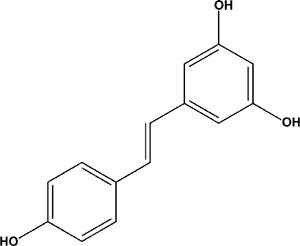 |
|
||||||||||
|
|
|||||||||||
ResveratrolFor years, scientists have been puzzled by the so-called "French Paradox": although the French tend to eat diets higher in saturated fats than American diets while exercising less and smoking more, people in France experience cardiovascular disease at a rate about 40% lower than that of Americans. Several studies have suggested that a possible solution to the French Paradox is the relatively high consumption of wine—particularly red wine—in France.
Particular attention has been given to a compound found in high concentration in grape skins called resveratrol, for research suggests that it is an antioxidant, affects lipid metabolism, acts as an anti-inflammatory, blocks platelet aggregation, slows the progression of many cancers, and possibly increases the human lifespan. Identification of such compounds is important, since the red wine itself can lead to a wide range of problems, both social and physical, from impaired judgment to liver damage. Although the news reports usually focus on the health benefits of red wine, resveratrol is also found in other food plants, including peanuts, mulberries, and raspberries. Resveratrol tablets are also available, although other related compounds found in the food plants are likely also effective in prevention of heart disease. Resveratrol, or trans-3,5,4'-trihydroxystilbene, belongs to a group of compounds called polyphenols. Cardiovascular Disease PreventionResveratrol's heart-disease prevention seems to arise from at least two different activities. First, the antioxidant activity of resveratrol has been shown to affect lipid metabolism. Since resveratrol contains both hydrophilic and hydrophobic components, it is believed to act more effectively than other well-known antioxidants, such as vitamins C and E. Resveratrol interacts with lipids, particularly low-density lipoproteins (LDLs, so-called "bad cholesterol"), and prevents peroxidative degradation of these lipids by scavenging oxygen free radicals. Damaged LDLs are more likely to form arterial plaques, so by preventing LDL degradation antioxidants guard against atherosclerosis. Resveratrol also appears to inhibit platelet aggregation, which in turn also helps to prevent the formation of plaques. Resveratrol has been shown to inhibit transcription of the genes that code for the cyclooxygenase enzymes COX-1 and COX-2. These enzymes are used by cells to produce prostaglandins, which, among other things, are the key mediators of platelet aggregation. The anti-COX activity of resveratrol also causes resveratrol's anti-inflammatory activity (see the Aspirin article). Cancer Prevention and TreatmentBesides their role in plaque formation, oxygen free radicals also damage DNA. Damage of certain genes, such as those involved in the regulation of the cell cycle, can cause a cell to become cancerous. By scavenging these oxygen free radicals, the antioxidant resveratrol helps to prevent cancer. Resveratrol has also been shown to induce apoptosis (programmed cell death) in cancer cells. Resveratrol appears to activate the p53 protein, which in turn induces apoptosis in cells in which DNA has been damaged. Additionally, resveratrol seems to induce apoptosis in some cancer cell lines through a p53-independent pathway. However, resveratrol has also been shown to act as a phytoestrogen, or plant-derived estrogen mimic. Since such compounds have been shown to possibly increase the risk of breast cancer in women, it is conceivable that resveratrol's cancer-preventing effect is at least partially offset by a tendency to increase the rate of cancer in women. An Elixir of Youth?Recent studies have shown yet another possible benefit of resveratrol. Research has shown that increasing the activity of a single gene, SIR2, can extend the lifespan of yeast by as much as 70%. It is believed that the protein product of this gene stabilizes DNA, and perhaps negatively regulates the p53 promoter. An analogous gene, SIRT1, has been identified in human cells. Resveratrol, along with several other polyphenols, appears to activate SIR2 in yeast cells. Yeast cells fed a diet including resveratrol were able to divide about 40 times before dying, compared to about 25 times for yeast on a diet lacking resveratrol. Similar results have been shown for fruitflies (granting about ten days to their usual one-month lifespan), but human studies are still a long way off.
The Future of ResveratrolResearch is continuing into the effects of resveratrol. In addition, some scientists speculate that resveratrol may only be the tip of the iceberg. These scientists propose that other, rarer polyphenols may be more effective than resveratrol at fighting heart disease, preventing cancer, or slowing aging; that resveratrol has come to our attention only because it is relatively common. For this reason, and because many vitamins and other healthful compounds have already been identified in various food plants, nutritionists recommend a diet rich in a wide variety of fruits and vegetables. Until future research identifies the effects (both good and bad) of the many compounds found in nature (alone and in combination), it is unlikely that a single pill will duplicate (or surpass) the effects of the French diet. |
 |
 |
Copyright 2006, John Wiley & Sons Publishers, Inc. |
 |
 |
